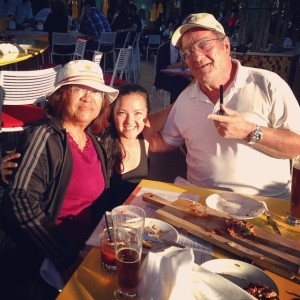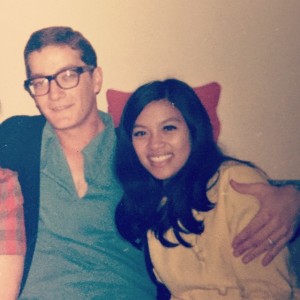
Nobody likes to talk about death, but here goes.
In the last year and a half, both of my parents died (Mom in June '13, Dad in December '14). In picking up the pieces, and contrasting their very different approaches to personal organization and accountability, I uncovered two crucial lessons.
1. Have the tough conversation, even though no one (including you) wants to have it.

I remember a couple of awkward conversations I had in middle school with my parents. We were in our living room, and my mom and dad were talking to each other about their final wishes and intentions.
It's odd -- at the time, little kid me shut down and disengaged from the conversation. I didn't want to even think about my parents not being around. But I still remember everything they said, almost verbatim.
"I want to be cremated," my mom said. "I don't want to rot in a grave."
"Me too," my dad added. "And I don't need a f*ckin' fancy urn, either. Spread my ashes."
"Yeah, same here. I want my ashes spread in Hawaii."
"And I want an Irish wake," said my dad, taking a big swig of his beer. "No crying. Everybody's drinking and having fun. Telling stories about Old Man Brassfield."
After my mom died, lots of family opinions surfaced on what we should do and what Mom wanted. But because of that conversation, and similar ones like it later, we were clear. It simplified everything and made the interactions we had with others much easier, because we were confident that we were carrying out her wishes as intended.
And when my dad died this month, I had no one to ask. Just my memory of those conversations. And we had an awesome Irish-style wake.
Have the tough conversation now, to save hours of painful analysis and indecision for your loved ones later.

Making assumptions that your spouse or kids know what you want steals precious mental energy from them at a vulnerable time. Instead of grieving, they're forced to agonize over what you might have wanted -- and potentially regret a bad decision.
I witnessed this at the mortuary, when I overheard a conversation in the room next to mine. The family was deliberating between urns, some of which were out of their budget. The woman said to the person accompanying her, "We'll have to think about this and come back tomorrow."
I can't imagine what that next scene at home was like, but I know it might have been avoided with a tough conversation.
2. If it's important, collect and store it in a logical spot.
My parents had two very different approaches here, but both ended up working perfectly.
Mom was a financial analyst, a notary public, MBA and lifelong student, and she kept meticulous records on everything that happened in their lives. So when I needed anything, from my dad's military records to our trust documents to the service records for the family cars, it was just a matter of finding the corresponding manila folder.
My dad wasn't as patient or passionate about organization, but he had his own deceptively simple system. When my dad died, I couldn't find their checkbooks or his most cherished possessions: his 101st Airborne ring, his Breitling watch, and the book of logins and passwords my mom maintained. He'd hide these items in the house, usually together, but I couldn't find them after looking in all the obvious places.
Then I thought about our recent conversations. He'd purchased an iPad 2, and we'd talked extensively about how to set up iCloud and some other apps. I looked in my old bedroom, and after rifling through a couple boxes, I saw the box for the iPad. I picked it up, and the weight in the box shifted unevenly. Bingo. I opened the box and it was all there.
Show your loved ones where to find important documents and items now, before they need to find them in a hurry.
Because of my mom's impeccable organization, I was able to find information I was clueless about but needed immediately, like my dad's Social Security number, his birthplace and his dates of military service.
In the days afterward, it was easy to find our trust documents, registration and service records for the cars, and even which companies and contractors they used around the house when things needed to get fixed.
I can't imagine how much of a hassle it would have been to notify government agencies, banks and lawyers if I had to search the house for this info.
Conclusion
When I think about productivity, I think about economy and efficiency in everything I do. How can I get the most done with the least effort or investment?
Proactivity is essential. So is a heavy dose of courage.
I'm grateful to my parents for a trillion reasons. But this month, I'm most thankful for how their actions in life enabled me to make efficient, accurate logistical decisions after their deaths and, ultimately, spend more time grieving and healing than agonizing over tiny details.









Member discussion